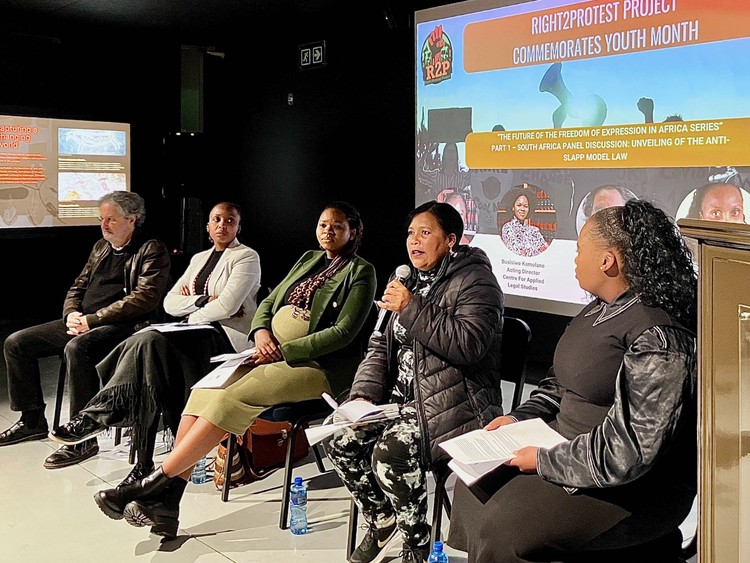
12 June 2024
On Tuesday the Centre for Applied Legal Studies, supported by Right2Protest, proposed a model law for protection against “SLAPP suits” (Strategic Litigation Against Public Participation). Photo: Masego Mafata
“SLAPP is a new approach to censorship, an effort to find different ways to make the lives of journalists and activists difficult,” said Anton Harber, executive director for the Campaign For Free Expression. He was speaking on Tuesday at Wits University at the launch of a proposed law to protect people against Strategic Litigation Against Public Participation (SLAPP) suits.
“We need to not just defend but actively prevent SLAPP actions,” he said.
The Centre for Applied Legal Studies (CALS), supported by Right2Protest (R2P), proposed the law. The law addresses a growing concern over SLAPP suits, a strategy used by corporations and wealthy individuals to stifle dissent.
In SLAPP suits critics are sued for huge amounts for alleged defamation in order to discourage, censor, intimidate and silence them.
Harber said it was concerning to note the increasing use of SLAPP suits around the world to silence journalists and activists.
Busisiwe Kamolane-Kgadima, CALS acting director, said, “We realised that activists were being arrested unlawfully, slapped with defamation cases and facing increasing victimisation. So we undertook a study to really understand what is happening to activists in South Africa. We saw a clear gap in the law, which is why we developed the model law.”
According to CALS, the proposed law is a blueprint for the legislature to work from when drafting laws in response to SLAPP suits. “They are free to accept in parts or in whole and make adjustments,” said Jessie Ditshego from CALS.
The proposed law intends to prevent and deter the “frivolous” use of legal processes to undermine the right of people to criticise corporations. It also aims to determine the court procedure for the adjudication of SLAPP suits and to provide remedies for those subjected to SLAPP suits.
Speaking at the launch, community activist Davine Witbooi (formerly Davine Cloete) from Lutzville, said, “When we stood up to defend our community against big mining corporations, nobody told us about SLAPP suits and how to defend ourselves against them. When I received a summons in 2017, people that I was working with on the ground stopped associating with me because they were scared.”
Witbooi (then Cloete) was one of six activists and lawyers involved in a protracted SLAPP suit brought by Australian mining company Mineral Commodities Ltd (known as MRC) and its South African subsidiary, Mineral Sands Resources (MSR).
The company accused six activists and lawyers of defaming the mining interests in books, interviews and presentations relating to the mines controversial activities on the Pondoland coast at Xolobeni and at the Tormin mineral sands mine on the West Coast. The matter was settled out of court last year.
Dr Keneilwe Radebe, a lecturer and commissioner at the Law Reform Commission said anti-SLAPP legislation is necessary to prevent people from weaponising the law and subjecting activists and journalists to lengthy, meritless legal processes.